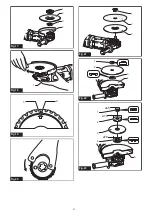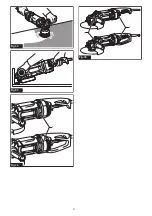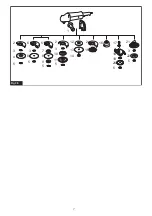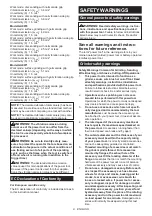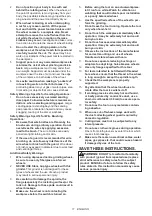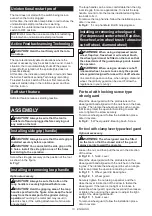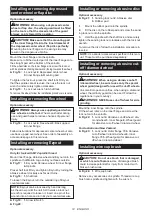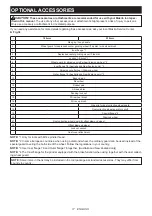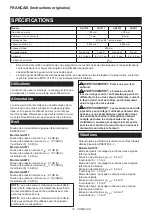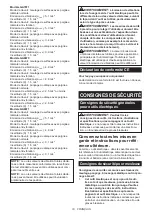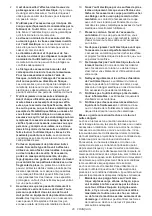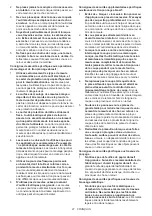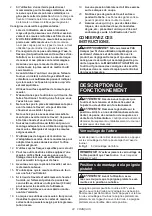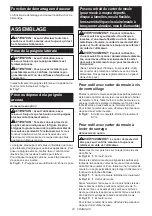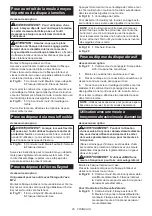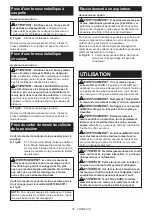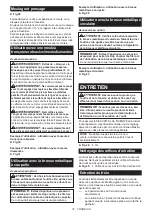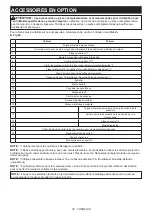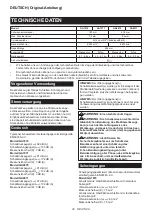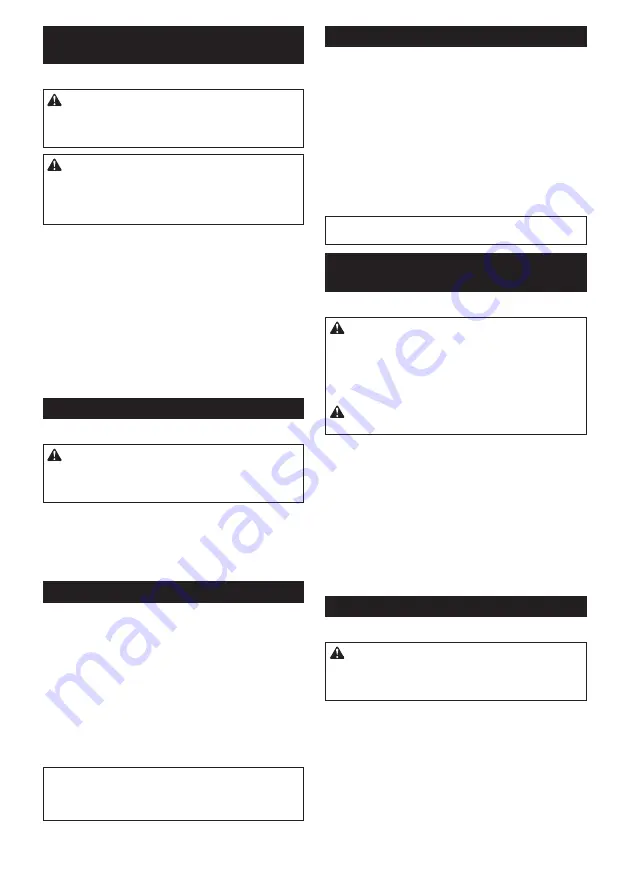
14 ENGLISH
Installing or removing depressed
center wheel or flap disc
Optional accessory
WARNING:
When using a depressed center
wheel or flap disc, the wheel guard must be fitted
on the tool so that the closed side of the guard
always points toward the operator.
CAUTION:
Make sure that the mounting part
of the inner flange fits into the inner diameter of
the depressed center wheel / flap disc perfectly.
Mounting the inner flange on the wrong side may
result in the dangerous vibration.
Mount the inner flange onto the spindle.
Make sure to fit the dented part of the inner flange onto
the straight part at the bottom of the spindle.
Fit the wheel/disc on the inner flange and screw the lock nut
with its protrusion facing downward (facing towards the wheel).
►
Fig.14:
1.
Lock nut
2.
Depressed center wheel
3.
Inner flange
4.
Mounting part
To tighten the lock nut, press the shaft lock firmly so
that the spindle cannot revolve, then use the lock nut
wrench and securely tighten clockwise.
►
Fig.15:
1.
Lock nut wrench
2.
Shaft lock
To remove the wheel, follow the installation procedure in reverse.
Installing or removing flex wheel
Optional accessory
WARNING:
Always use supplied guard when
flex wheel is on the tool.
Wheel can shatter during
use and guard helps to reduce chances of personal
injury.
►
Fig.16:
1.
Lock nut
2.
Flex wheel
3.
Back up pad
4.
Inner flange
Follow instructions for depressed center wheel but also
use back up pad over wheel. See order of assembly on
accessories page in this manual.
Installing or removing Ezynut
Optional accessory
Only for tools with M14 spindle thread.
Mount inner flange, abrasive wheel and Ezynut onto the
spindle so that Makita Logo on Ezynut faces outside.
►
Fig.17:
1.
Ezynut
2.
Abrasive wheel
3.
Inner flange
4.
Spindle
Press shaft lock firmly and tighten Ezynut by turning the
abrasive wheel clockwise as far as it turns.
►
Fig.18:
1.
Shaft lock
To loosen the Ezynut, turn the outside ring of Ezynut
counterclockwise.
NOTE:
Ezynut can be loosened by hand as long
as the arrow points the notch. Otherwise a lock nut
wrench is required to loosen it. Insert one pin of the
wrench into a hole and turn Ezynut counterclockwise.
►
Fig.19:
1.
Arrow
2.
Notch
►
Fig.20
Installing or removing abrasive disc
Optional accessory
►
Fig.21:
1.
Sanding lock nut
2.
Abrasive disc
3.
Rubber pad
1.
Mount the rubber pad onto the spindle.
2.
Fit the disc on the rubber pad and screw the sand
-
ing lock nut onto the spindle.
3.
Hold the spindle with the shaft lock, and securely
tighten the sanding lock nut clockwise with the lock nut
wrench.
To remove the disc, follow the installation procedure in
reverse.
NOTE:
Use sander accessories specified in this man
-
ual. These must be purchased separately.
Installing or removing abrasive cut-
off / diamond wheel
Optional accessory
WARNING:
When using an abrasive cut-off
/ diamond wheel, be sure to use only the special
wheel guard designed for use with cut-off wheels.
(In some European countries, when using a diamond
wheel, the ordinary guard can be used. Follow the
regulations in your country.)
WARNING:
NEVER use cut-off wheel for side
grinding.
Mount the inner flange onto the spindle.
Fit the wheel / disc on the inner flange and screw the
lock nut onto the spindle.
►
Fig.22:
1.
Lock nut
2.
Abrasive cut-off wheel / dia
-
mond wheel
3.
Inner flange
4.
Wheel guard
for abrasive cut-off wheel / diamond wheel
For Australia and New Zealand
►
Fig.23:
1.
Lock nut
2.
Outer flange 78
3.
Abrasive
cut-off wheel / diamond wheel
4.
Inner
flange 78
5.
Wheel guard for abrasive cut-
off wheel / diamond wheel
Installing wire cup brush
Optional accessory
CAUTION:
Do not use brush that is damaged,
or which is out of balance.
Use of damaged brush
could increase potential for injury from contact with
broken brush wires.
►
Fig.24:
1.
Wire cup brush
Remove any accessories on spindle. Thread wire cup
brush onto spindle and tighten with the wrench.
Summary of Contents for GA7071
Page 2: ...1 Fig 1 1 2 3 Fig 2 1 2 3 Fig 3 B C 2 1 A Fig 4 B C 2 1 A Fig 5 1 Fig 6 Fig 7 1 2 3 Fig 8 2 ...
Page 5: ...1 Fig 24 1 Fig 25 1 2 4 5 6 3 Fig 26 Fig 27 1 2 Fig 28 Fig 29 Fig 30 Fig 31 5 ...
Page 6: ...Fig 32 Fig 33 1 Fig 34 1 2 Fig 35 6 ...
Page 7: ...1 2 3 5 4 6 3 3 8 5 9 7 8 5 6 11 10 5 12 13 14 20 18 19 5 17 21 3 22 5 2 2 15 16 Fig 36 7 ...
Page 118: ...118 ...
Page 119: ...119 ...




